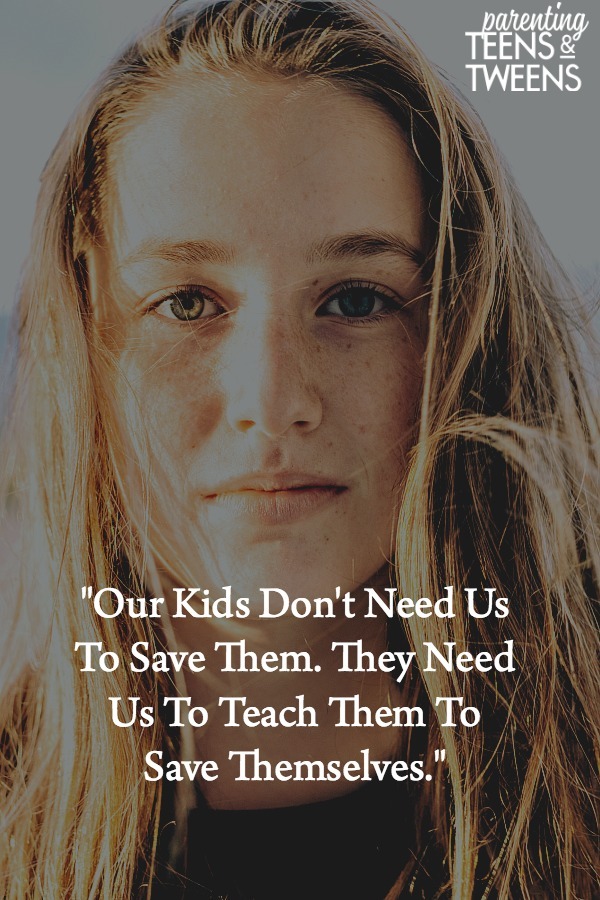Inside: Seeing our kids struggle can be heartbreaking, but helping your teen deal with disappointment is part of showing them how to discover their own inner strength.

As the tears rolled down his face, I sat there holding him tight.
Each sob came harder than the next, and with each rise and fall of his shoulders, I could feel his heart breaking, and mine along with it.
I wanted so much to rewrite this unforeseen plot twist of his life.
It would have been so easy to weave the words of this story differently for him by pointing fingers, placing blame and raging against the injustice of it all.
But while it might turn a nightmare into a fairytale for a little while, I knew all too well that other villains lay in wait.
So, instead, I chose to remain silent.
I could no longer kiss away this pain like his little boy boo boos.
All I could do was stay beside him, letting the sadness and anger and frustration wash over him until he was exhausted with it all.
Why is it so hard to watch our tweens and teens be disapopinted?
Our kids are going to get knocked around in life and sometimes they are going to get knocked down.
It sucks as a parent to watch it happen.
Things will happen to them that are incredibly unfair. Decks will be stacked, games will be rigged, and politics and pettiness will have their part to play as well.
Then there will be times when there aren’t external forces conspiring against them.
They may suffer crushing disappointments when they don’t have quite enough talent to make the team or land a role in the school play. Dreams may be broken when they lack the test scores to get into the school they’ve always wanted to attend.
In some cases, they even sabotage themselves.
They don’t show enough heart or put forth enough effort. They fail to follow their own instincts or they just straight out make bad choices.
Related: Dear Daughter, I’m Handing Over Your Happiness to You Now
Life is hard, and we don’t want to let it harden our children.
But we also don’t want it to turn them into victims. We want them to be able to overcome, build resilience and to take ownership for their actions..
Is this possible?
We all know it is, but it requires us to accept one difficult truth in order to help a teen deal with disappointment
As our children get older they don’t need us to save them, they need us to teach them how to save themselves. We can’t fix all our adolescent’s problems.
Where do we begin when it comes to helping teens deal with disappointment and heartbreak?
We show them that we believe they are strong enough, by letting them fight their own battles without interfering. We let them face the consequences of poor decisions. We help them gain perspective by surviving setbacks.
We let them feel disappointment so they know that it is temporary, and the sun will shine again.
And in time, our faith in them will build their faith in themselves.
8 Tips to Help Your Teen Deal with Disappointment
- Acknowledge your feelings: during adolescence, it’s important for tweens and teens to understand that feeling disappointment is normal, and they should not be ashamed or embarassed to express it. Give them permission to experience these emotions, but try not to let it consume them. Remember, their feelings are big, but their life perspective is small.
- Use healthy coping mechanisms: Unfortunately, many tweens and teens turn to electronics in order to pass time and numb their feelings through mindlessly scrolling or playing video games and never actually deal with their negative emotions. Instead, caregivers should help them deal with their disappointment in more positive ways, such as talking about it with a friend (or mental health therapist), journaling, doing something creative, deep breathing exercises or meditation, or even walking or excercise. Self care is an important life skill.
- Provide perspective: This is tricky, as parents should not try to dismiss their teen’s disappointment or appear condescenting. Instead, parents can remind their teens of obstacles they’ve overcome in the past and that whatever made them disappointment does not define their worth or dictate their future. It can also help to discuss what they learned from the experience.
- Maintain open communication. It’s okay if your teen or tween doesn’t want to continuously rehash their problems, but make sure you keep the communication lines open, stay available, and continuously monitor their mood. As long as they are dealing with their disappointment in a healthy way, it’s okay if they don’t talk about it with you.
- Encourage them to seek support: Feeling alone in their situation is often the hardest part about managing feelings of disappointment. Ensuring your teen has a support system, such as friends, youth group, a mentor, coach, or other trusted adult, to talk to who may be able to talk about a similar experience can make all the difference.
- Set new goals. Resilient people know that setbacks or disappointmenting results are a normal part of life. Instead of succumbing to those feelings, encourage your teen to set new goals and develop a plan to work torwards them.
- Focus on strengths and passions: Try to encourage your teen to have a well-rounded life that is not only focused on one thing. Engaging in activities they enjoy but are not centered around achievement can help boost their self-esteem and re-focus them when they stumble in other areas.
Editor’s note: If your teen appears to be experiencing persistent feelings of sadness or hopelessness, or expresses thoughts of suicide, seek out professional help from a doctor or mental health practitioner.
Disappointment can be a stepping stone to confidence
As parents, it’s our job to listen and provide advice without telling them what to do or giving them step-by-step instructions, and soon your big kids will have confidence in their own problem-solving abilities.
And sometimes, there will be the times, like this one with my son, when all we can do is hold them while they cry–and that might be enough.
To help a teen deal with disappointment means understanding that you might feel powerless in those moments But take heart in knowing that you are actually teaching them the most powerful lesson of all – how to show empathy, compassion and love.
Are you in the thick of raising your tweens and teens? You may like this book by Whitney Fleming, the co-owner of Parenting Teens & Tweens: Loving Hard When They’re Hard to Love: Essays about Raising Teens in Today’s Complex, Chaotic World.

Parenting teens and tweens is hard, but you don’t have to do it alone. Here are some other posts you may like:
Why We Have To Let Our Teens Suffer Through Their Poor Decisions
Six Tips for Raising Teens During These Crazy Midlife Years
Our Teens are Lonelier than Ever: 3 Ways Parents Can Help
The Common Mistakes Teenagers Make and Why Parents Need To Let Them Make Them








Leave a Comment